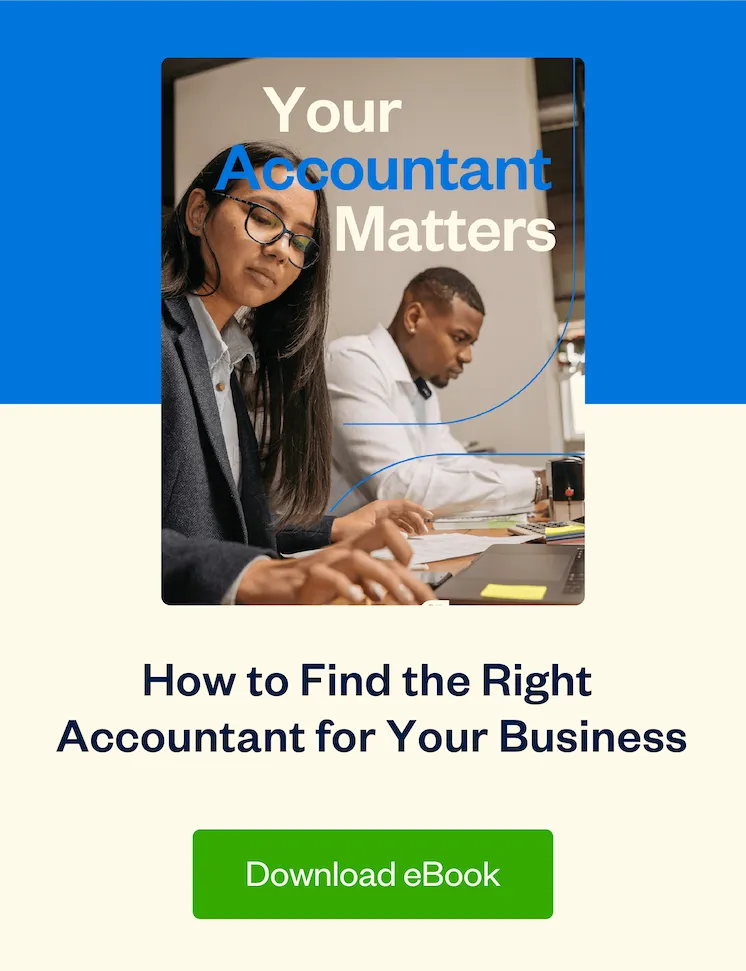Get the right financial help for your business, right when you need it.

As a small business owner, the success of your business depends on making smart financial decisions and good use of your time. Both those things can be improved by working with a great small business accountant, but how do you find the right one? And how do you know when the time is right for your growing business to get help?
Let’s take a look at how you can find the perfect small business accountant, how to match your needs to their skill set, and what questions to ask to make sure it’s a good fit.
Table of Contents
When Should You Hire an Accountant?
If you’ve been doing your own books, how do you know when it’s time to bring in help? Sometimes, you just know. You can tell that you’re stretching yourself too thin or that you just don’t have the bookkeeping or accounting chops to handle the increasing complexity of your growing business.
If you feel like you’re spending too much time working in your business and don’t have any time to work on your business, that’s a good sign that you would benefit from working with a small business accountant or bookkeeper.
Bookkeepers vs. Accountants vs. CPAs
Before you can start looking for a small business accountant or bookkeeper to help, you need to know what kind of help you need. You may ask yourself: What’s the difference between bookkeeping and accounting? Do I need a certified public accountant (CPA)? What kind of work do I actually need help with?
The short answer is: It depends. Businesses have different needs. Here’s a brief rundown of each role.
Bookkeeper
Think of bookkeeping as the starting point. Bookkeepers take your day-to-day transactions and record them in your accounting software (yes of course accounting software like FreshBooks). This can include recording income and expenses, tracking accounts payable and receivable, reconciling your books with bank records, and keeping up with connected bank feeds.
Accountant
Accounting picks up where the bookkeeper left off. A small business accountant can take the financial information recorded by a bookkeeper and use it to analyze the business’ health, prepare financial statements, and file your taxes (though not all accountants do taxes). Accounting is a more analytical process that turns the output of bookkeeping into useful insights into your small business.
CPA
So, what about CPAs? Certified public accountants are accountants who have had specific training and education, and passed a rigorous exam on business and accounting concepts and regulations. Some accounting tasks can only be performed by a CPA (like auditing financial statements and filing with the SEC). Hiring a CPA when certification isn’t necessary may be more expensive.
So, Should You Hire an Accountant—or a Bookkeeper?
According to Brittany Turner, CPA and founder of modern accounting firm Countless, “If a business owner feels in over their head when it comes to bookkeeping, I would say to start by finding a bookkeeper or an accountant that can offer bookkeeping services. The bookkeeping does need to come first. Even with the best accountant in the world, if the bookkeeping is not current or correct, there won’t be anything for the accountant to work with. Bookkeeping is the foundation.”
At the risk of muddying the waters, we need to stop and mention that there is a lot of overlap between these two processes, at least in terms of the professionals who do them. Many accountants also offer bookkeeping. However, if all you need is bookkeeping, it may be unnecessarily costly to hire an accountant.
In addition, many professionals who use the title bookkeeper go beyond traditional bookkeeping services to offer analysis and advisory services. Look beyond the title and find out what a bookkeeper truly offers.
Some accountants also partner with a bookkeeper to offer a bundle of services all in one place. This lets you have the best of both worlds without having to juggle multiple engagements. It’s also important to find a bookkeeper or accountant that uses accounting software that you’re also comfortable using. If your accounting software is too complicated for you or your team to do small time-saving tasks like entering expenses or creating invoices then you might not be working as efficiently as possible.
Specialists vs. Generalists
Should you look for an accountant who specializes in your industry, or can any accountant give you the help you need?
The principles of accounting are largely the same across industries, so any qualified accountant can help you a great deal in your business. But a specialist can offer unique insights. This is especially true if you’re in a complex or fast-changing industry.
For example, lawyers face different regulations than other professional services, so an accountant who specializes in legal practices would be ideal. If your business is in e-commerce, a specialist will be able to help you navigate the complex sales tax issues, and recommend apps and tools to make your business run more smoothly.
A specialist may be more expensive than a general accountant, but it can be well worth the investment when you need the expertise. Think of it like a trip to the doctor. Your family physician can help with the majority of what you need, but when you need surgery or an expert opinion on a specific health issue, you’re going to want to see a specialist.
Communicating With Your Small Business Accountant
One of the biggest struggles for many small business owners is communicating with their accountants. You need to be on the same page to benefit from working with an accountant, especially if you are looking for advisory services and guidance. If you can’t reach your accountant or can’t make sense of what they tell you, you’re no better off than someone who has no accountant at all.
Find an Accountant Who Listens
Whether you choose a generalist or a specialist, your accountant should always specialize in your business. In other words, you need an accountant who listens to you and learns about your unique needs, rather than taking a cookie-cutter approach. Start a dialog with your prospective accountants to make sure they’re easy to talk to and interested in listening to what you need.
Consider Communication Style
Next on the communication front is ensuring you and your accountant don’t have conflicting expectations when it comes to communicating. Do you prefer to handle things by phone while your accountant likes asynchronous communication like email? Do you need more frequent contact and opportunities to ask questions while your accountant expects to talk only once a month?
Cloud-based accounting software like FreshBooks makes it easy to collaborate on your financial record keeping. You can share your accounting system with your accountant directly in the app, without dealing with paper files or email attachments.
Whatever your needs and expectations, make sure they match your accountant’s expectations and the service package you’re looking at.
Find Someone You Like
Finally, even if you and your small business accountant match up on paper, you may not be a good match on a personal level. Your accountant is a partner in your business journey. You may be looking for an outside firm to handle your books and accounting, but you still want to be sure they fit with your company culture and values, and that you enjoy working with them.
“Working with a professional in regards to anything having to do with money is going to require a good personality fit. Whether it’s an accountant, tax preparer, bookkeeper, or financial advisor. The better the relationship we have with these professionals, the more open we will be, which will result in better outcomes. Taxes and accounting are terrible enough. Why make it worse by working with someone you don’t like?” says Turner.
The right financial expert will help you stay motivated and keep your business on the right track. So, where do you find someone like that?
Where Should You Look for a Small Business Accountant?
There are a number of places you can find a good accountant for your small business.
Local Listings
If you’re looking for a local accountant, a Google business search is a good place to start. Check reviews and ratings to see what other business owners think and ask around to see if anyone you know has worked with the accountants you find.
Networking
Are you involved in any business networking groups or online communities? Consider asking business owners you know and trust for their recommendations. If they’re in the same industry as you, this can be an especially helpful way to find a qualified accountant who’s already been vetted by someone you know.
Referrals
Your accounting software provider can also be a great source of referrals for you. Many providers have a way of connecting you with financial professionals who are certified in the software and would be a good fit for your needs. When you sign up for FreshBooks, our support team gathers some information on your business and your needs, and connects you with a few bookkeepers and accountants who match what you’re looking for.
Using cloud accounting software can make it easier to hire the right accountant for your business because you’re not limited by geography. When you are able to work seamlessly with an accounting professional anywhere in the world, you can open up your search and focus on the services and specializations you need.
Accountant Partner Programs
Some accounting software programs, like FreshBooks, have accounting partner programs. These programs match users with accountants who work with the same accounting software. This allows both the business owners and accountants to align on accounting software upfront while leveraging the benefits of the program and support teams.
How Much Does a Business Accountant Cost?
You may be wondering what to expect in terms of cost. There’s no single, flat rate for accounting services, so let’s talk about the variables.
First off, remember that bookkeeping, accounting, and the specialized services that require a CPA are all likely to cost different amounts. Make sure you’re not paying for services you’re not going to use.
In addition to the level of expertise you require, the scope of your needs will have a big impact on cost. Typically, the more work that’s involved the more you’ll pay.
If your business is simple, you can probably find a simple bookkeeping or accounting package to meet your needs. If you have a complex business with several bank accounts, a high volume of transactions, and a lot of moving parts, you’re likely to pay a little more.
Some Advice on Getting What You Pay For
“You get what you pay for” rings true for accounting professionals, but there are two sides to that truth.
First, make sure you know what you’re paying for. If your accountant charges you an hourly rate, you can find yourself worrying about how efficient they are and how much your bill will be this month. More and more, accountants and bookkeepers are charging a flat rate per month, based on the scale of the work and the value they provide. This gives you some stability in your budget and ensures that you’re not paying for downtime.
Second, while some accountants may charge more for their experience or expertise, it can be a great investment for your business. Seeking out the cheapest option can leave you with subpar service and without the support you really need.
A few hundred extra dollars invested in accounting could be worth thousands to your business, while also cutting your stress and saving you time. That’s a great return on investment by any measure!
6 Things to Ask Your Prospective Business Accountant
So, you’ve found a few potential accountants and you’ve set up a call or reached out by email. What questions should you ask to help you find the perfect match? Here are 5 questions to ask.
1. Do You Have Experience With Businesses Like Mine?
Whether you’re looking for an industry specialist or just someone who’s familiar with a business roughly the same size as yours, this question can help you get a feel for how well your accountant knows their stuff.
2. What Services Do You Offer?
This is a great way to make sure all your bases are covered as simply as possible. I’ve already mentioned bookkeeping and accounting services. You may also need someone to provide tax preparation and planning, advisory, or payroll services. Not all accountants offer all of these, so make sure they can do everything you need them to do.
3. How Do You Price Your Services?
Hourly or flat fees? What’s included at that price? Automated withdrawals or monthly invoices? The goal here isn’t necessarily to find the cheapest option, but you need to know what you’re getting into and how each accountant stacks up.
4. Can I Reach You With Questions When They Come Up?
A variation on this: How do you communicate with your clients? And how often?
There’s nothing more frustrating (for both parties) than mismatched expectations around communication and support. If you need to reach your accountant frequently and they expect to speak only at scheduled monthly meetings, you’re not going to have the kind of support you need. Make sure you’re in alignment here and expect to pay a bit more for more comprehensive support.
5. How Can You Help Me Run My Business Better?
Accountants and bookkeepers can do so much more than put numbers in boxes! This is your chance to see how proactive your accountant is, and if they are ready and willing to partner with you for the good of your business.
6. Which Accounting Software Do You Use?
If you have a preference as to which accounting software you use as a small business owner to do things like invoice, track business expenses, run financial statements, evaluate cash flow, and do your business taxes then talk about it upfront.
Next Steps
Now that you know what you’re looking for, it’s time to go out there and find the right accountant for your small business. Working with the right accountant or bookkeeper can save you time and money, drastically reduce your stress, help you better understand your business financial statements, and help you take your business to the next level.
This post was updated in January 2022.

Written by Josh Richards, Freelance Contributor
Posted on June 30, 2021
This article was verified by Janet Berry-Johnson, CPA and Freelance Contributor

 How to Work Effectively With Your Accountant in FreshBooks
How to Work Effectively With Your Accountant in FreshBooks 5 Accounting Mistakes That Put Your Business at Risk
5 Accounting Mistakes That Put Your Business at Risk With FreshBooks, Ottawa’s Excentric Agency Is Invoicing 5 Times Faster
With FreshBooks, Ottawa’s Excentric Agency Is Invoicing 5 Times Faster



![How to Choose the Right Bookkeeping Service [Free Checklist]](https://www.freshbooks.com/blog/wp-content/uploads/2018/10/Checklist-Hero@2x-226x150.jpg)
![Your Accountant Matters: How to Find the Right One for Your Business [Free eBook]](https://www.freshbooks.com/blog/wp-content/uploads/2022/03/Blog_Post_Image-226x150.jpg)
